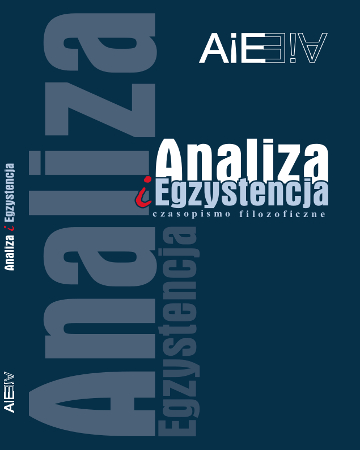
ISSN: 1734-9923
eISSN: 2300-7621
OAI






Issue archive /
30 (2015)
O tolerancji politycznej z punktu widzenia Michaela Walzera
(Political toleration from the perspective of Michael Walzer)
| Authors: |
Dorota
Sepczyńska
Uniwersytet Warmińsko-Mazurski w Olsztynie |
| Keywords: | political philosophy, tolerance, Michael Walzer, relativism, universalism |
| Data publikacji całości: | 2015 |
| Page range: | 27 (61-87) |
Abstract
The main focus of this article is little known in Poland political tolerance. The article aims to: reconstruct of Michael Walzer concept of the political tolerance; to place it in the typology of relativism – universalism; to make a first step towards the separation of political tolerance from personal tolerance for a general discussion of tolerance; demonstrate that tolerance is not only modern, liberal concept, associated with the individual freedom; show that the dispute about tolerance not only between the enemies.
Download file
Article file
Bibliography
| 1. | Banasiak B., Kucner A., Wasyluk P. (red.) (2012), Demokracja, tolerancja, oświe- cenie, Olsztyn: Instytut Filozofii UWM. |
| 2. | Bell D. (2012), Communitarianism, [w:] E.N. Zalta (red.), The Stanford Encyclo- pedia of Philosophy (Spring 2012 Edition), http://plato.stanford.edu/archives/ spr2012/entries/communitarianism. |
| 3. | Buchowski M., Chlewińska K. (2012), Tolerance and Cultural Diversity Disco- urses in Poland, ACCEPT PLURALISM Research Project, grant agreement no. 243837, 7th Framework Programme Social Sciences and Humanities, European University Institute Robert Schuman Centre for Advanced Studies, San Domenico di Fiesole, http://www.eui.eu/Projects/ACCEPT/Documents/ Research/wp1/ACCEPTPLURALISMWp1BackgroundreportPoland.pdf. |
| 4. | Buchowski M., Chlewińska K. (2012), Tolerance of Cultural Diversity in Poland and Its Limitations, ACCEPT PLURALISM 7th Framework Programme Project 2012/34, European University Institute Robert Schuman Centre for Advanced Studies, San Domenico di Fiesole, http://cadmus.eui.eu/bitstream/ handle/1814/24381/ACCEPT_WP5_2012_34_Country-synthesis-report_Po- land.pdf?sequence=1. |
| 5. | Buchowski M., Chlewińska K. (2012), Tolerance of Diversity in Polish Schools: The Case of Roma Children and Ethics Classes, ACCEPT PLURALISM Policy Briefs 2012/02, European University Institute Robert Schuman Centre for Advanced Studies, Florence, http://cadmus.eui.eu/bitstream/handle/1814/20505/ACCEPT_PLURALISM_Policy Brief_2012_02_Poland.pdf. |
| 6. | Habermas J. (2008), Filozofia w czasach terroru. Rozmowy z Jürgenem Haberma- sem i Jacques’em Derridą, przeprowadziła i koment. opatrzyła G. Borradori, red. A. Szahaj, tłum. A. Karalus, M. Kilanowski, B. Orlewski, Warszawa: Wydawnictwo Akademickie. |
| 7. | Kymlicka W. (1992), Two Models of Pluralism and Tolerance, „Analyse & Kritik” t. 14, nr 1, s. 33–56. |
| 8. | Lazari-Pawłowska I. (1984), Trzy pojęcia tolerancji, „Studia Filozo czne” nr 8, s. 105–118. |
| 9. | Marcuse H. (1969), Repressive Tolerance, [w:] R.P. Wolff, B. Moore Jr., H. Marcuse, A Critique of Pure Tolerance, Boston: Beacon Press. |
| 10. | Rawls J. (1985), Justice as Fairness: Political not Metaphysical, „Philosophy and Public Affairs” t. 14, nr 3, s. 223–251. |
| 11. | Rawls J. (1987), The Idea of an Overlapping Consensus, „Oxford Journal of Legal Studies” t. 7, nr 1, s. 1–25. |
| 12. | Rawls J. (1988), Priority of Right and Ideas of the Good, „Philosophy and Public Affairs” t. 17, nr 4, s. 251–276. |
| 13. | Rawls J. (1989), The Domain of the Political and Overlapping Consensus, „New York University Law Review” t. 64, nr 2, s. 233–255. |
| 14. | Rawls J. (1994), Teoria sprawiedliwości, tłum. M. Panufnik, J. Pasek, A. Romaniuk, Warszawa: Wydawnictwo Naukowe PWN. |
| 15. | Rawls J. (1998), Liberalizm polityczny, tłum. A. Romaniuk, Warszawa: Wydawni- ctwo Naukowe PWN. |
| 16. | Sepczyńska D. (2010), Filozo a tolerancji wobec lozo i: liberalizm polityczny Johna Rawlsa, [w:] M.M. Bogusławski, T. Sieczkowski (red.), Filozofia: ogląd, namysł, krytyka?, Olsztyn: Instytut Filozo i UWM, s. 158–172. |
| 17. | Traktat między głównemi mocarstwami sprzymierzonemi i stowarzyszonemi a Pol- ską podpisany w Wersalu 28 czerwca 1919 r., Dz.U. 1920, nr 110, poz. 728. |
| 18. | Trybusiewicz J. (1968), De Maistre, Warszawa: Wiedza Powszechna. |
| 19. | Walzer M. (1983), Spheres of Justice: a Defense of Pluralism and Equality, New York: Basic Books (wyd. pol. Sfery sprawiedliwości. Obrona pluralizmu i równości, tłum. M. Szczubiałka, Warszawa: Wydawnictwo UW 2007). |
| 20. | Walzer M. (1987), Interpretation and Social Criticism: The Tanner Lectures on Human Values 1985, Cambridge: Harvard University Press (wyd. pol. In- terpretacja i krytyka społeczna, tłum. M. Rakusa-Suszczewski, M. Szuster, Warszawa: Aletheia 2002). |
| 21. | Walzer M. (1990), A Critique of Philosophical Conversation, [w:] M. Kelly (red.), Hermeneutics and Critical Theory in Ethics and Politics, Cambridge: MIT Press, s. 182–196. |
| 22. | Walzer M. (1994), Thick and Thin: Moral Argument at Home and Abroad, Notre-Da- me: University of Notre Dame Press (wyd. pol. Moralne maksimum, moralne minimum, tłum. J. Erbel, Warszawa: Wydawnictwo Krytyki Politycznej 2012). |
| 23. | Walzer M., Miller D. (red.) (1995), Pluralism, Justice, and Equality, Oxford: Oxford University Press. |
| 24. | Walzer M. ( 1997), On Toleration, New Haven: Yale University Press (wyd. pol. O tolerancji, tłum. T. Baszniak, Warszawa: PIW 1999). |
| 25. | Žižek S. (2010), Przemoc. Sześć spojrzeń z ukosa, tłum. A. Górny, Warszawa: Muza. |